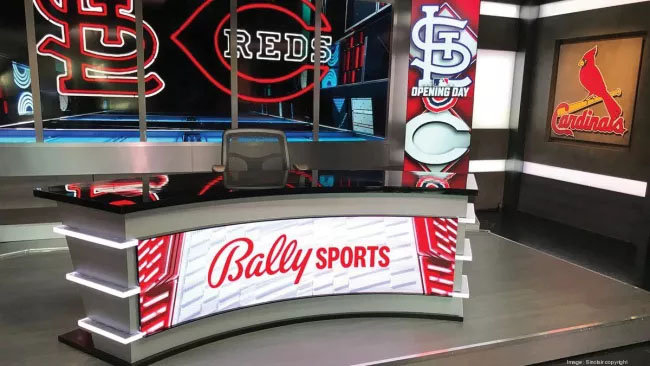(Image credit: Sinclair)
By
Source: www.nexttv.com, October 2021
After MLB commissioner Rob Manfred said his league has no interest in giving the broadcaster DTC rights, analyst Richard Greenfield tries to pull the plug on broadcaster’s seemingly desperate gambit
LightShed Media Partners analyst Richard Greenfield has described a decidedly bleak prospect for Sinclair Broadcast Group successfully transitioning its debt-ridden Bally Sports-branded regional sports networks into a direct-to-consumer streaming service.
It‘s “#GameOver” for that gambit, Greenfield said in a posting this morning.
“Sinclair has tried to convince investors that it can avoid a Diamond Sports bankruptcy by transforming its 14 RSNs from being locked into the legacy MVPD/vMVPDs bundles to a direct-to-consumer, over-the-top streaming service … and that there is a robust sports betting opportunity for the Diamond Sports RSNs to take advantage of,” Greenfield wrote.
The analyst may have gotten the number of Bally Sports RSNs operated by Sinclair’s Diamond Sports Group wrong — it‘s actually 21.
But Greenfield appears spot on when he said that the whole pitch appears based on a “fabrication:” That is, all 14 Major League Baseball teams that have linear TV licensing deals with Bally Sports RSNs are willing to also license their DTC/streaming rights to Diamond Sports.
Last week, MLB Commissioner Rob Manfred damned the plan — and perhaps, Diamond Sports into eventual bankruptcy — when he said simply that Sinclair doesn‘t “have the rights” it needs to pull off an ambitious DTC plan revealed to investors over the spring.
Extrapolating further, Greenfield described MLB as being philosophically similar to the NBA in terms of how it manages digital rights. The MLB did decide in 2019 to let its teams negotiate their digital rights themselves. To date, however, only four of the 14 MLB teams that Sinclair partners with have offered up their OTT rights: the Miami Marlins, the Tampa Bay Rays, the Kansas City Royals and the Milwaukee Brewers.
Ultimately, Greenfield believes, MLB and NBA teams will work with their respective league and a third-party technology vendor to make their own DTC services, re-negotiating with pay TV operators to preserve whatever revenue is left from the linear ecosystem.
And Sinclair very likely won’t be a part of those forward-looking enterprises, he said.
”Sinclair has no expertise in digital or streaming, has never built a direct-to-consumer subscription business and only covers a portion of the U.S.,” Greenfield added. “Sinclair is actually one of the worst possible choices for the leagues to partner with in digital.”
Classifying Sinclair as an absolute digital beginner is too harsh.
Not only does the broadcaster‘s portfolio include 185 local broadcast stations, but several digital over-the-air channels, hybrid AVOD/local programming streaming service STIRR, a major investment in ATSC 3.0 tech and the shared local-news service NewsON, plus a better integrated ad-selling infrastructure.
But again, Greenfield’s larger point — that Sinclair and Diamond have a tough ninth-inning rally in front of them — holds up.
Sinclair bought the Fox Sports RSNs from Disney, as well as the Marquee Network and YES Network, in August 2019 for $9.6 billion, putting them under the control of a separate company it owns, Diamond Sports, and selling the naming rights to the channels.
Much as they did in 2015, when AT&T paid $49 billion for DirecTV, analysts questioned what the heck Sinclair management was thinking paying a such a huge sum of money amid declines for the multichannel video programming distributor business.
Sinclair was left trying to pay off nearly $10 billion in debt with an RSN business that has annually escalating costs in the form of team contracts, but declining EBITDA from pay TV customers continuing to exit the ecosystem.
“After Sinclair purchased the Fox RSNs from Disney, we wrote that we expected the newly renamed Diamond Sports RSN group’s EBITDA of $1.6 billion to turn negative by 2025,” Greenfield noted.

